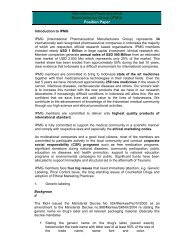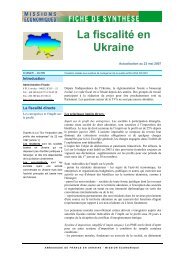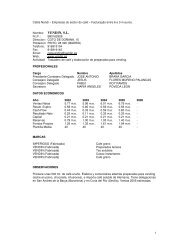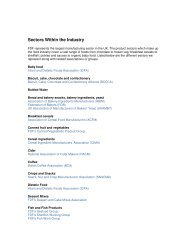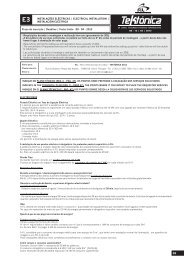You also want an ePaper? Increase the reach of your titles
YUMPU automatically turns print PDFs into web optimized ePapers that Google loves.
elocation.qxd 15/12/2005 21:23 Page 26<br />
RELOCATION<br />
26<br />
Social Security System<br />
The welfare state is undergoing massive reforms. Here’s what you should know<br />
about what the state can do for you ... and what you must do for it.<br />
<strong>Germany</strong>'s generous, comprehensive cradle-to-grave<br />
social welfare system was<br />
once the envy of many nations. But now<br />
the state has been hit by a funding crisis,<br />
resulting in part from the greying of the<br />
population, forcing the government to<br />
undertake major and unpopular reforms.<br />
People employed in <strong>Germany</strong> - including<br />
trainees, the military and civil servants -<br />
must contribute to four principal social<br />
insurance schemes. Half the contribution<br />
is paid by the employer, half by the<br />
employee.<br />
The contributions are: Rentenversicherung<br />
(pension insurance), 19.5 percent;<br />
Arbeitslosenversicherung (unemployment<br />
insurance), 6.5 percent;<br />
Krankenversicherung (health insurance),<br />
14.3 percent (average); and<br />
Pflegeversicherung (nursing care insurance),<br />
1.85 percent (1.7 if you have children).<br />
EXEMPTIONS<br />
If you’re working fewer than 15 hours a<br />
week, or in some cases on a short-term<br />
contract, you will not have to pay contributions.<br />
Some self-employed people are<br />
also exempt, but artists, journalists and<br />
workers in publishing must pay if their<br />
income exceeds a certain amount. This is<br />
handled by the Künstlersozialkasse in<br />
Wilhelmshaven. Since 1 January 1999, selfemployed<br />
people working primarily on a<br />
long-term basis for one major client or<br />
employer must also contribute.<br />
Those starting new businesses in <strong>Germany</strong><br />
can be exempt from contributions for up<br />
to three years. In certain cases, evidence<br />
that you have made provision for retirement<br />
can also exempt you.<br />
The days of a pan-European pension<br />
scheme are a long way off, but if you work<br />
in two or more EU countries you should<br />
be able to combine contributions paid in<br />
each to qualify for a pension.<br />
BENEFITS<br />
Several countries, including the United<br />
States, Canada and Australia, have social<br />
security agreements with <strong>Germany</strong> allowing<br />
their citizens to claim benefits. It’s<br />
worth asking your embassy if this will<br />
help you, and which papers you’ll need.<br />
If you become unemployed in <strong>Germany</strong><br />
you must register with the local employment<br />
office or Arbeitsamt. Some say they<br />
can be surprisingly helpful; others’ tales<br />
are grimmer.<br />
As part of Schroeder's reform agenda, the<br />
last government moved to cut benefits for<br />
the long-term unemployed, attempted to<br />
speed up the process for people finding<br />
jobs as well as offering inducements for<br />
those without work to set up their own<br />
business.<br />
EU citizens resident in <strong>Germany</strong> are generally<br />
eligible for social security and<br />
unemployment benefits. They can apply<br />
for Sozialhilfe (income support), and<br />
Wohngeld (housing benefit) at their local<br />
Sozialamt — but a wad of evidence is usually<br />
required before a benefit is approved.<br />
You can claim an old-age pension at age<br />
65. While this remains the main source of<br />
old-age income, the government has<br />
begun offering tax breaks to encourage<br />
workers to supplement it with private<br />
retirement schemes. This reflects a worry<br />
that the deficit-hit pension scheme will be<br />
unable to meet future demands.<br />
The result: a raft of new private retirement<br />
schemes has hit the pension market. These<br />
can be arranged through banks and most<br />
insurance firms; it is wise to shop around<br />
to see which policy suits you.<br />
GERMANY EXPAT SURVIVAL GUIDE WWW.EXPATICA.COM










